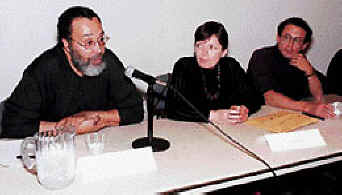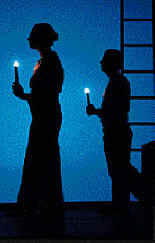Balancing free inquiry and responsibility
By Leslie Virostek
 With
our 21st-century
sensibilities, there may be no debate that Nazi medical experiments on Jews
and the Tuskegee syphilis study on African American men were immoral. Not so
clear, however, are the ethical boundaries of cloning and other emerging
sciences. How are scientists to behave between the poles of free inquiry on
the one hand and responsibility on the other? And what is at stake for the
rest of us?
With
our 21st-century
sensibilities, there may be no debate that Nazi medical experiments on Jews
and the Tuskegee syphilis study on African American men were immoral. Not so
clear, however, are the ethical boundaries of cloning and other emerging
sciences. How are scientists to behave between the poles of free inquiry on
the one hand and responsibility on the other? And what is at stake for the
rest of us?
The year-long Scientific Freedom and Responsibility Co-Curricular Initiative is bringing together members of the Trinity community and beyond to grapple with such issues. Exploring fundamental moral questions associated with scientific inquiry of the past, present, and future, the initiative includes panel presentations, a film series, a performing arts series, and a spring symposium that features experts from around the world.
Lisa Oliveri '04, a double major in biology and French, says the initiative's broad theme is directly connected to her future. “Though I have not chosen a particular concentration of biology to study, the whole issue of responsibility in scientific freedom is important to me because I wish to work in a research field some day,” she says. “What is decided in today's society about the responsibilities and scientific freedoms for scientists will set the standard to which I will be adhering in the future.”
Interdepartmental collaboration
The initiative is sponsored
by a diverse group that includes the Interdisciplinary Science Center, the
Human Rights Program, the Luce Professor of Health and Human Rights, the
Department of Theater and Dance, and the Trinity Center for Collaborative
Teaching and Research. Suzanne O'Connell, director of the
Interdisciplinary Science Center, emphasizes that the audience for the initiative goes well beyond Trinity's science faculty and majors. She notes
that it is important for scientists to think about their work in a larger
context and that it is equally important for the larger community to concern
itself with what scientists are doing. Thus, the initiative approaches the
theme from a number of disciplines, perspectives, and media. The Department of
Theater and Dance, for example, contributed
to the discussion with four performances, including Capitalistic Acts
Between Consenting Adults (pictured left), an adaptation of Aldous
Huxley's prophetic novel Brave New World.
initiative goes well beyond Trinity's science faculty and majors. She notes
that it is important for scientists to think about their work in a larger
context and that it is equally important for the larger community to concern
itself with what scientists are doing. Thus, the initiative approaches the
theme from a number of disciplines, perspectives, and media. The Department of
Theater and Dance, for example, contributed
to the discussion with four performances, including Capitalistic Acts
Between Consenting Adults (pictured left), an adaptation of Aldous
Huxley's prophetic novel Brave New World.
Sharing perspectives
Faculty members from philosophy, public policy, and psychiatry are also among those participating in one way or another. Associate Professor of History Dario A. Euraque brought a very personal perspective to the topic as part of a panel discussion held in October. Euraque's cousin was “disappeared” 20 years ago, a victim of state-sponsored political terror in Honduras. Euraque's presentation, “The Science of Forensic Anthropology and Human Rights in the Americas,” was, he says, “an attempt to tie a personal experience with what I think are some important issues within the broader sense of scientific freedom and responsibility.” He discussed how forensic anthropology today can bring criminals of the past to justice and urged the audience to consider the dilemma of forensic scientists—such as those in Argentina in the 1980s—whose work could implicate the very governments that have charged them to find the truth.
The initiative is linked to a diverse cluster of courses, and students in these courses may take a half-credit independent study, which requires them to go to the initiative's events, to keep a journal about both the events and their reactions to them, and to produce a culminating project to tie it all together.
Student and faculty exchange
Euraque believes that in addition to being informative for students, the initiative's events are valuable because they promote a very broad, interdisciplinary approach to scholarship. Students, he points out, are seeing faculty members learning from one another. “People from different disciplines can see how borders are not closed,” he says. The initiative has also created opportunities for students to be involved as participants rather than simply audience members. Student moderators lead discussions after the faculty panel presentations. At film series screenings, they offer the audience some context for what they are about to see and give them some questions to consider for discussion at the end of the film. Allison E. Zanno '04, a moderator for Fat Man and Little Boy, a film about the use of the atomic bomb in World War II, hopes to go to medical school and was drawn to the initiative because of her particular interest in the perspective of patients' rights. She says the initiative provides a valuable forum for students. “I think that it's a really good place for stu-dents to voice their ideas, and it's interesting to see other people's points of view.”
The program continues in the second semester with the same rich mixture of coursework, performing arts events, and films. Lisa Oliveri urges all members of the campus community to attend. “Whether people like it or not, the advancement of science will affect virtually everyone at some point,” she says, “and now is the time to become familiar with and to ask questions about what the limitations are for science in the future.”